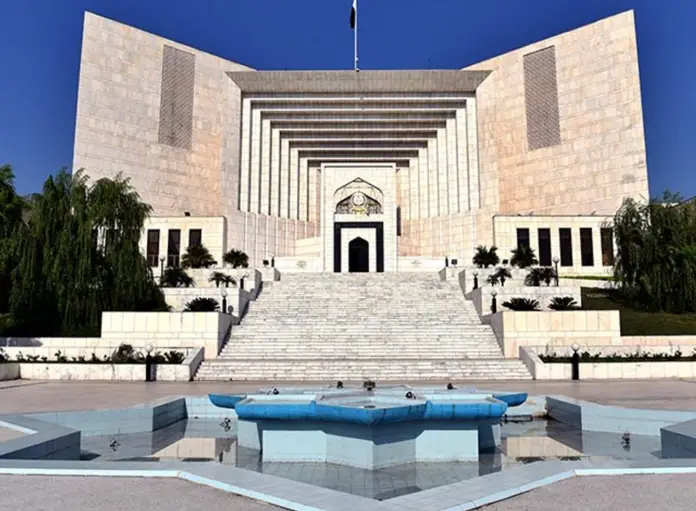The Supreme Court on Monday formed a five-member larger bench on a presidential reference seeking interpretation of Article 63-A of the constitution, which deals with disqualification of parliamentarians over defection.
However, the names of the judges who will constitute the bench are yet to be finalised. The reference was submitted by Attorney General of Pakistan (AGP) Khalid Jawed Khan earlier in the day under Article 186, related to the advisory jurisdiction of the SC. A two-judge bench, consisting of Chief Justice of Pakistan (CJP) Umar Ata Bandial and Justice Munib Akhtar, took up the reference along with a plea filed by the Supreme Court Bar Association (SCBA) seeking the top court’s intervention to prevent “anarchy” ahead of the no-trust vote.
At the hearing, the court said a political party that wanted to become a respondent in the reference may file an application. The court then adjourned the hearing until March 24. The reference reportedly presents two interpretations of Article 63-A and requests the court to advise which one should be followed.
According to the first interpretation, “khiyanat (dishonesty) by way of defections warrants no pre-emptive action save de-seating the member as per the prescribed procedure with no further restriction or curbs from seeking election afresh.”
The second interpretation “visualises this provision as prophylactic, enshrining the constitutional goal of purifying the democratic process, inter alia, by rooting out the mischief of defection by creating deterrence, inter alia, by neutralising the effects of the vitiated vote followed by lifelong disqualification for the member found involved in such constitutionally prohibited and morally reprehensible conduct.”
In the reference, President Dr Arif Alvi also asked the apex court whether a member who “engages in constitutionally prohibited and morally reprehensible act of defection” could claim the right to have his vote counted and given equal weightage or if there was a constitutional restriction to exclude such “tainted” votes.
He also asked the court to elaborate whether a parliamentarian, who had been declared to have committed defection, would be disqualified for life.
“What other measures and steps can be undertaken within the existing constitutional and legal framework to curb, deter and eradicate the cancerous practice of defection, floor crossing and vote-buying?” the reference further asks. “As happened on many occasions in past, the stage is yet again set for switching of political loyalties for all sorts of illegal and mala fide considerations including vote-buying which by its very nature rarely leave admissible or traceable evidence,” the reference states.







